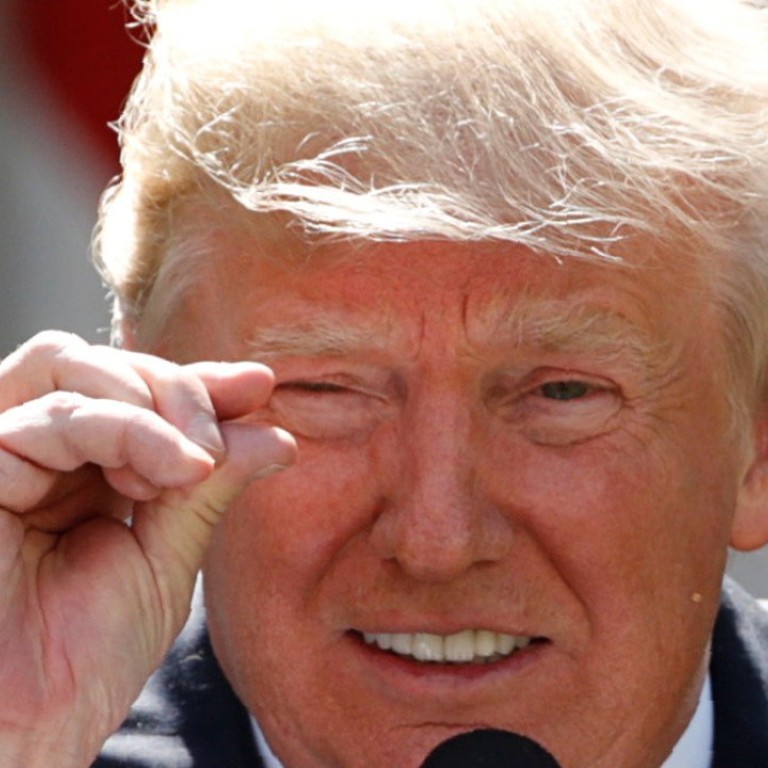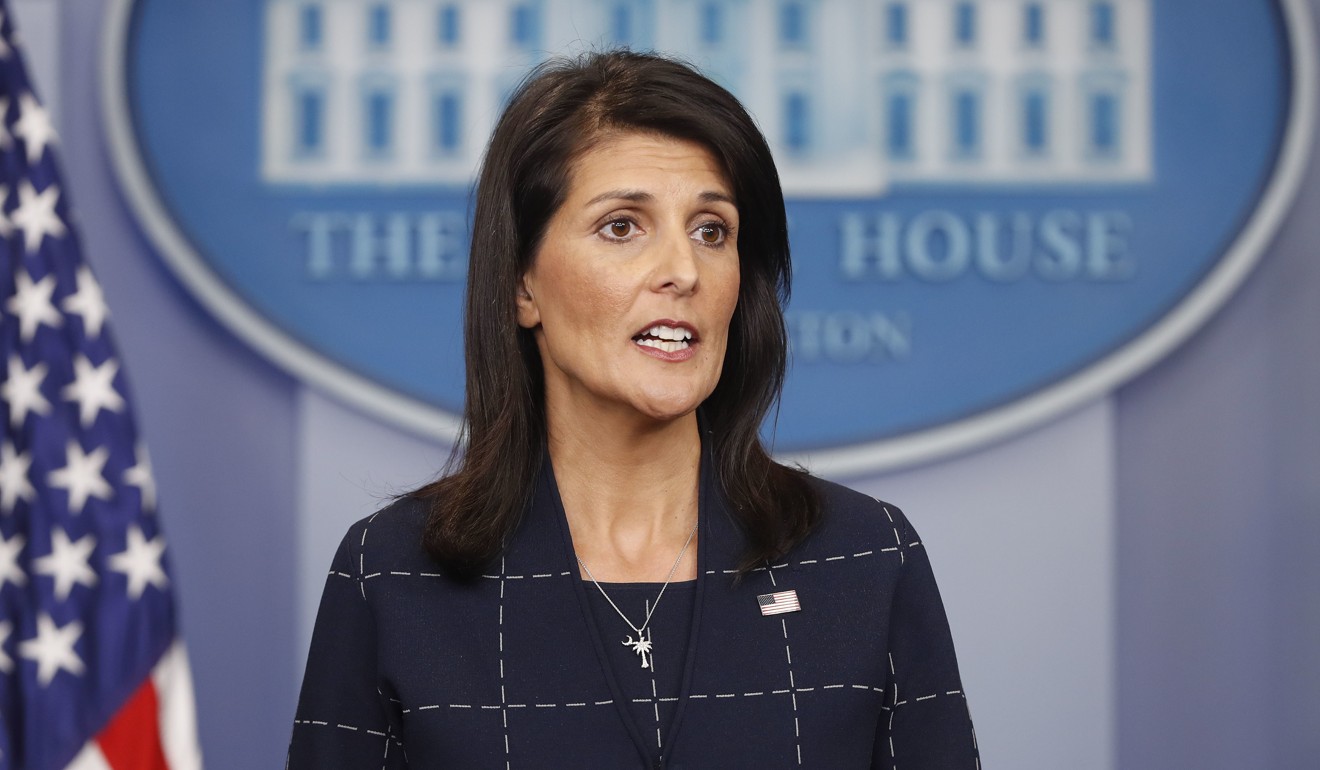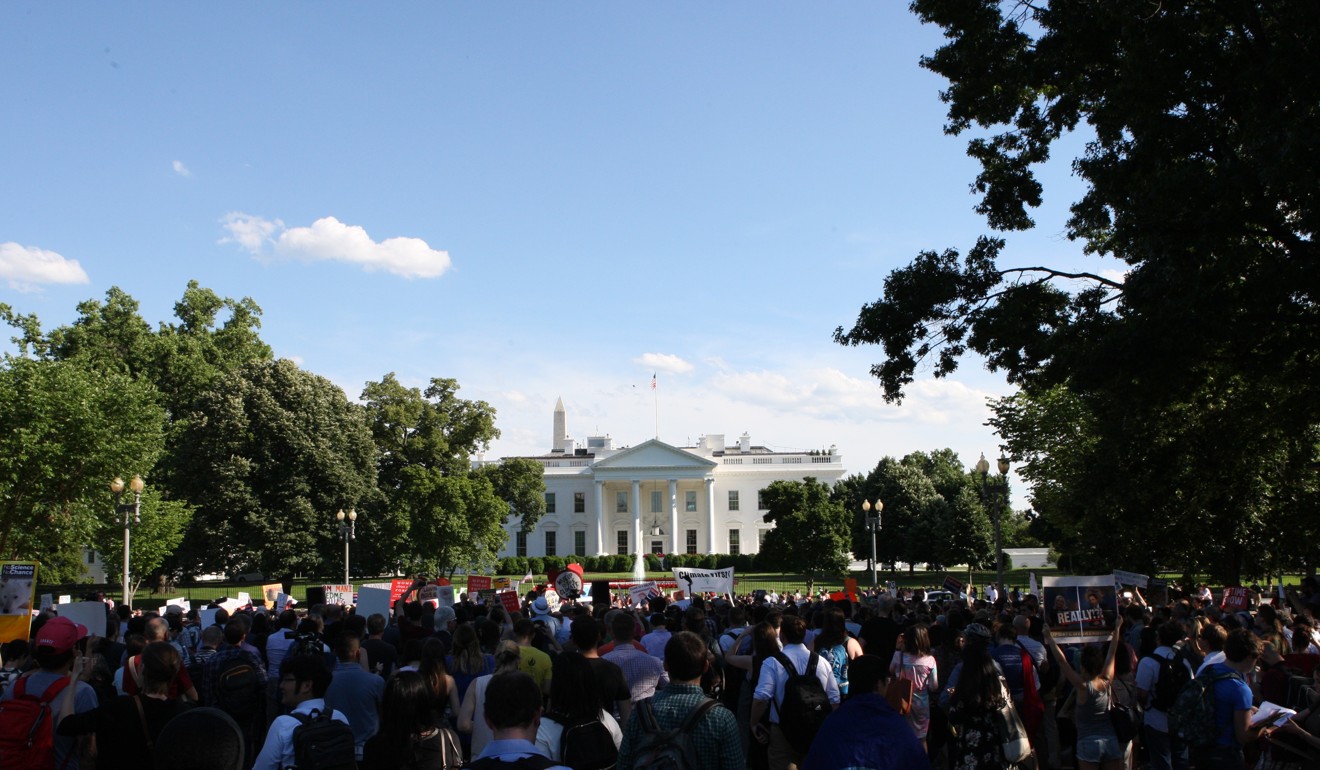
US President Donald Trump believes in climate change despite withdrawal from Paris agreement, UN ambassador says
Donald Trump insists he’s an environmentalist. But on the biggest issue of the day – the origins of climate change – his position has shifted back and forth dramatically
US President Donald Trump insists he’s an environmentalist. Yet on the biggest issue of the day – the origins of climate change – his exact position remains a mystery. Trump’s ambassador to the UN offered some clarity on Saturday, though: Nikki Haley said in a pair of interviews that Trump believes the world’s climate is changing, and that man-made “pollutants” are playing a role in that.
In Trump’s 31-minute remarks in the White House Rose Garden on Thursday, pulling the US out of the Paris climate accord, the president never stated his personal view about whether climate change is man-made. Questioned about the president’s view, press secretary Sean Spicer earlier in the week said: “Honestly, I’ve never asked him.”
At a briefing on Thursday, administration officials chided reporters asking Trump’s views on climate science to stay on topic. Just on Friday, his environmental chief Scott Pruitt was asked about Trump’s views on the origins of global warming.
Watch: White House defends withdrawal from Paris climate deal
“All the discussions we’ve had for the last several weeks” have focused strictly on whether Paris was a good deal for America, Pruitt said. When it was pointed out that he still hadn’t answered the question, Pruitt responded: “I did answer the question.”
Haley filled in some of the blanks during interviews in which she defended the decision to exit the climate accord.
“[Trump] believes the climate is changing. And he believes pollutants are part of that equation. So that is a fact. That is where we are,” Haley said in an excerpt from an interview to run in full on CNN’s State of the Union on Sunday.
She made similar comments to CBS for Sunday’s Face the Nation broadcast, according to a transcript provided by the network, while declining to elaborate on the term “pollutants”.
“Just because the US got out of a club, doesn’t mean we aren’t going to care about the environment,” Haley said on CNN. “[The US will] continue to be leader in the environment [but] under our terms.”
The “club” Haley referred to is comprised of almost 200 countries, with Syria, Nicaragua, and now the US the notable holdouts.
Trump’s decision was criticised by many scientists and environmentalists, political opponents, the mayors of dozens of US cities, executives from several major companies including Goldman Sachs Group and Apple, and world leaders from France’s President Emmanuel Macron to Pope Francis.
Watch: Trump claims Paris accord more about financial gain
Trump has put forth various views in the past. He joined a 2009 letter calling on then-president Barack Obama to lead on fighting the dangers of climate change.
But as his criticisms of Obama increased over the years, so did that of climate science. He suggested in 2012 that the concept of global warning was “created by and for the Chinese in order to make US manufacturing non-competitive” – a claim he’s neither backed away from nor repeated lately.
This isn’t merely about semantics. The mystery over Trump’s climate views could complicate US efforts to negotiate greenhouse gas reduction agreements with other countries – the kind of new deal Trump said he would be willing to pursue as he announced his Paris decision. If climate change is a hoax, after all, why would it make sense to force China or India to further curb their use of fossil fuels?
“The idea that it’s a hoax really makes you look like even more of an outlier than not wanting to do anything about it,” said Jennifer Marlon, a research scientist with the Yale Programme on Climate Change Communication.
This debate could also inject climate science into the 2018 midterm elections and the presidential race in 2020.
Trump frequently mentions that he is “someone who cares deeply about the environment”. In meetings with European leaders in May, he mentioned the environmental awards his company has received, and he’s pledged to protect clean air and clean water even as he repeals governing greenhouse gas emissions.
In recent years, Trump has issued scores of tweets deriding climate change and the global effort to fight it. In 2012, he said global warming was “based on faulty science and manipulated data”.
And in November 2012 Trump joked about needing global warming while it was “freezing and snowing in New York” – a theme he returned to again in January, March and December the following year as well at least three times in 2014.
“This very expensive GLOBAL WARMING b******* has got to stop,” Trump tweeted in January 2014. “Our planet is freezing, record low temps, and our GW scientists are stuck in ice.”
Trump later cast his hoax assertion as a laugh line.
“I often joke that this is done for the benefit of China,” Trump told Fox & Friends in January 2016, adding: “China does not do anything to help climate change.”
There is an almost universal scientific consensus on the issue. In 2013, the Intergovernmental Panel on Climate Change reported with 95 per cent confidence that humans are warming the planet. And that warming is becoming harder to ignore: the 10 hottest years on record all happened since 1998 – and 2016 was the warmest ever, followed by 2015.

“At this point the White House does not want to say that climate change is a hoax,” said John Coequyt, head of international climate programmes for the Sierra Club. “That is not a position that is supportable by the facts or embraced by the public. And when they say things like that, it makes them look crazy.”
Americans who worry “a great deal” about climate change rose to a three-decade high of 45 per cent this year, up from 37 per cent in 2016, according to a Gallup poll.
But they remain deeply split about whether climate change is caused by human activity. In a survey last year by Pew Research Centre, just 45 per cent of respondents agreed that the Earth is getting warmer mostly because of human activity.
The views break along party lines. While 79 per cent of self-described liberal Democrats surveyed by Pew said human activity is causing the Earth to warm, just 34 per cent of moderate Republicans and 15 per cent of conservative Republicans agreed.

The partisan split may explain why top Trump administration officials have approached the issue gingerly, with carefully worded assertions that the climate is changing but it is not clear how much – or how to meaningfully address it.
The formulation allows them to avoid accusations that they are “climate deniers” while also dodging any explicit acknowledgment that the use of fossil fuels is a factor, much less a specific prescription for addressing the phenomenon.
“What the president is not doing is saying he’s not going to try to improve the climate,” Commerce Secretary Wilbur Ross said on NBC. Trump is saying that the Paris agreement “is destructive of economic growth”.
“He is an environmentalist,” Ross said. “I’ve known him a long time. He’s very pro-environment.”

